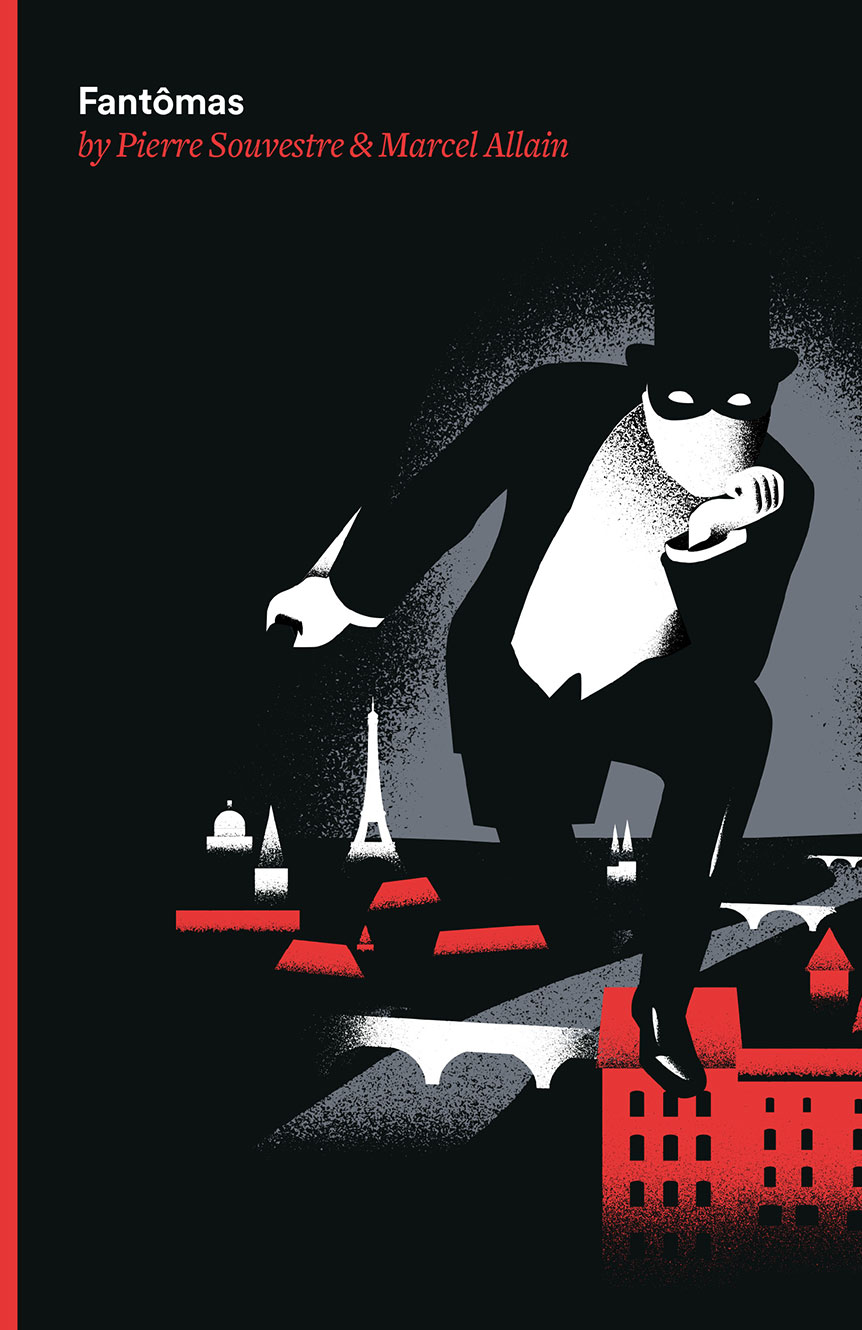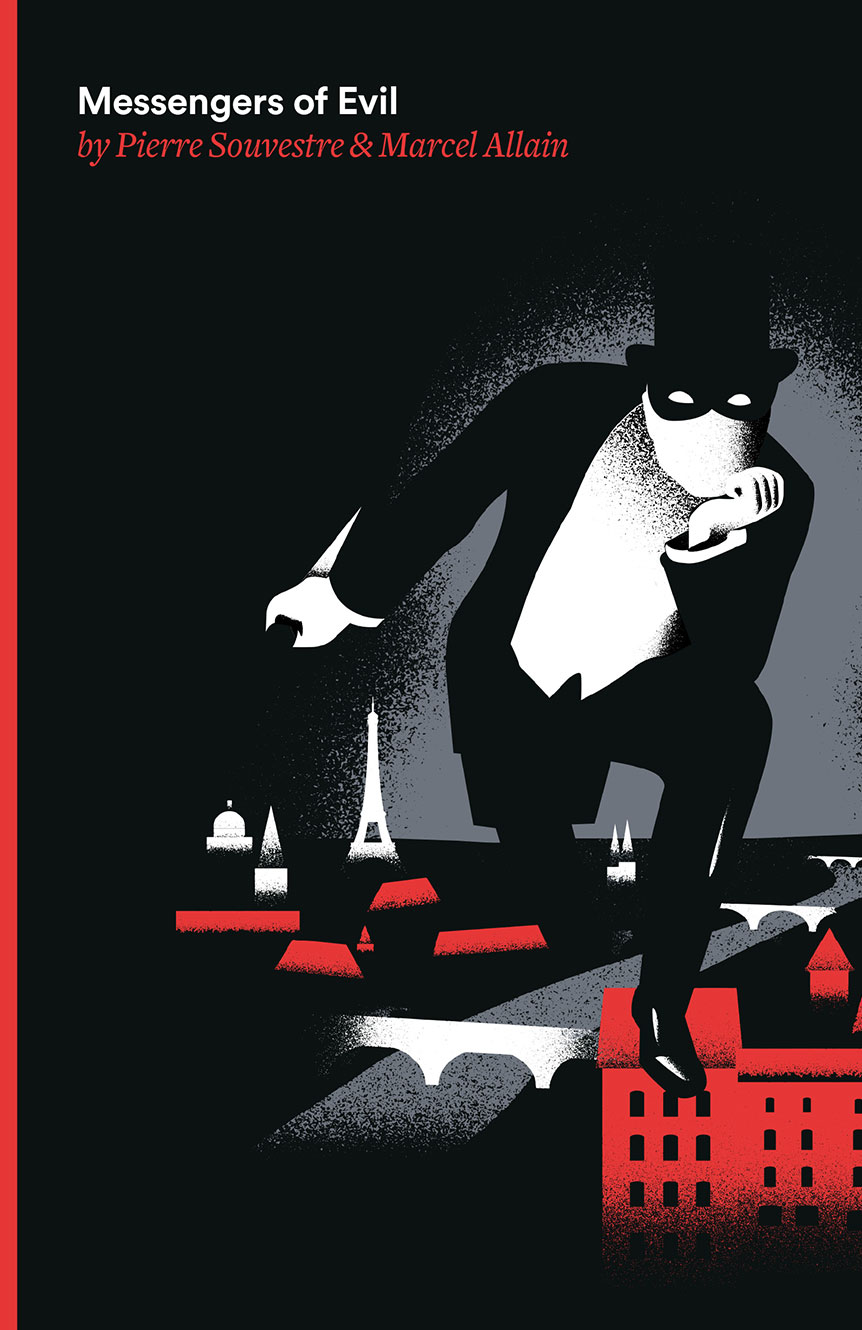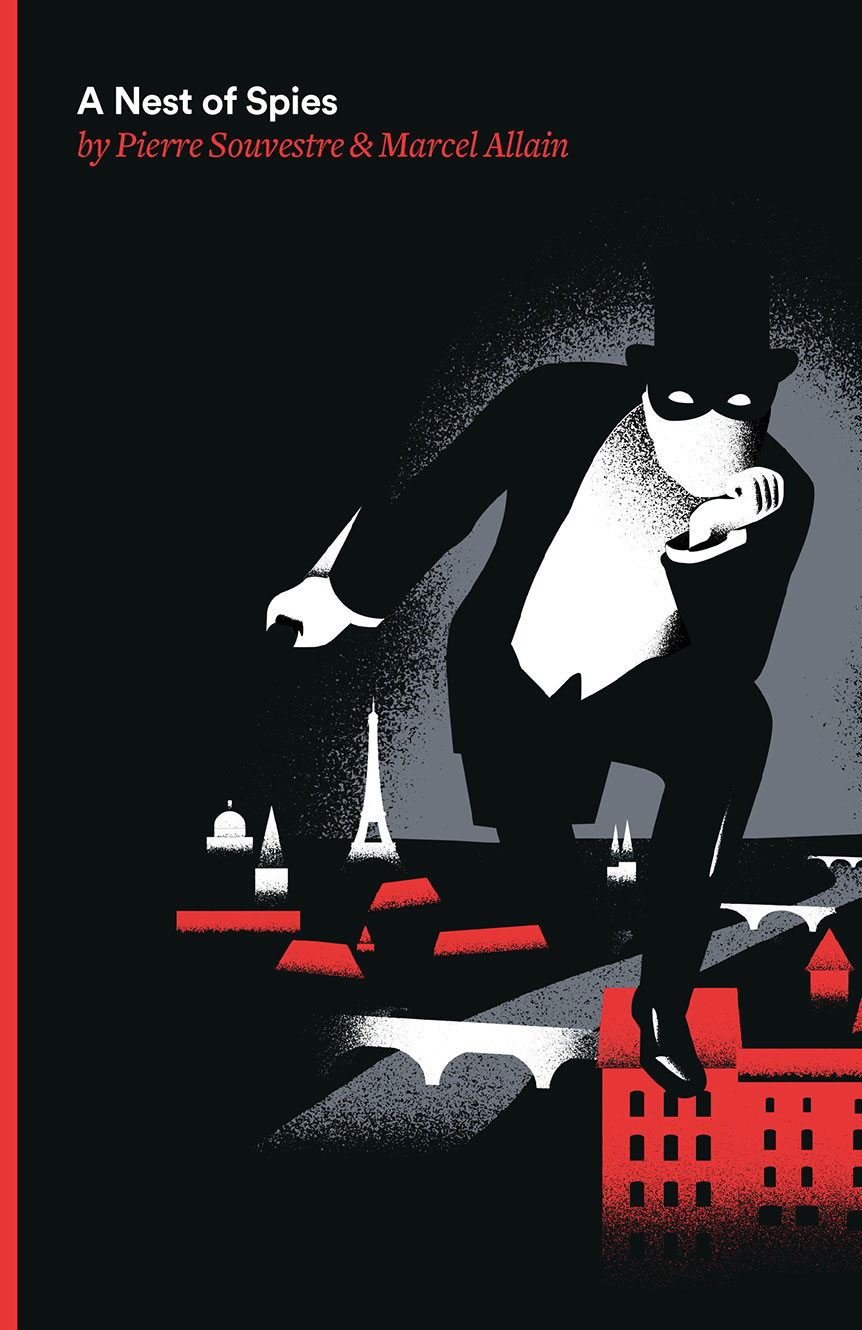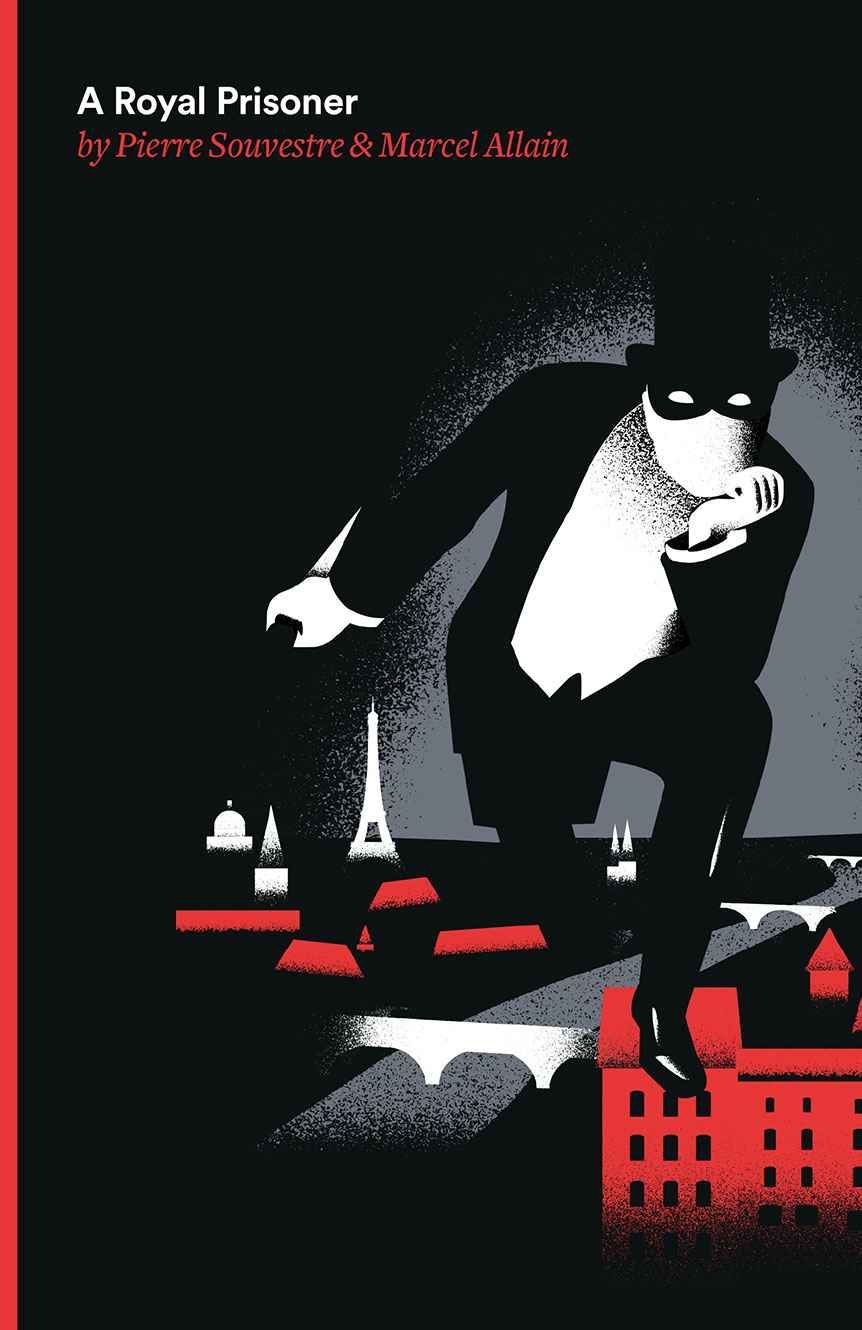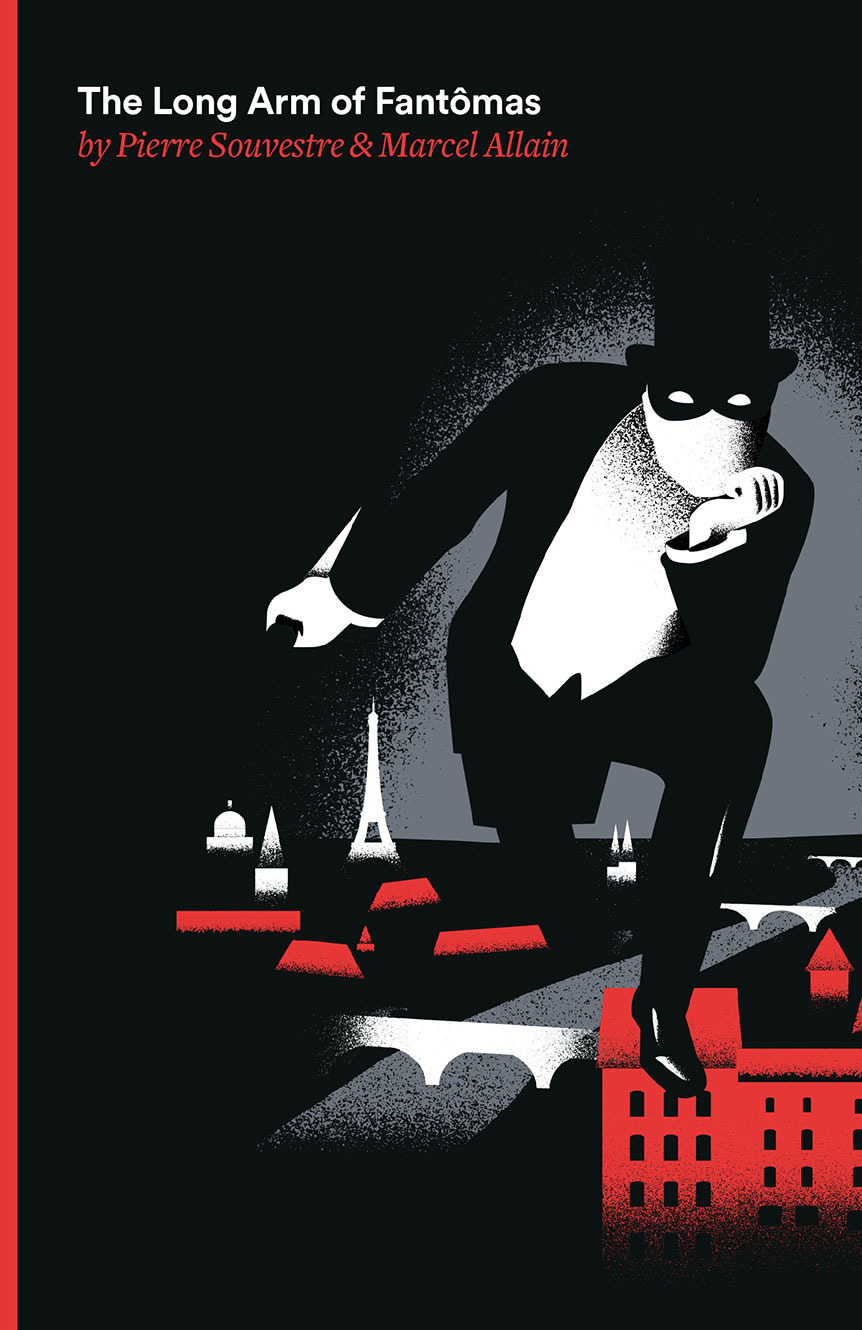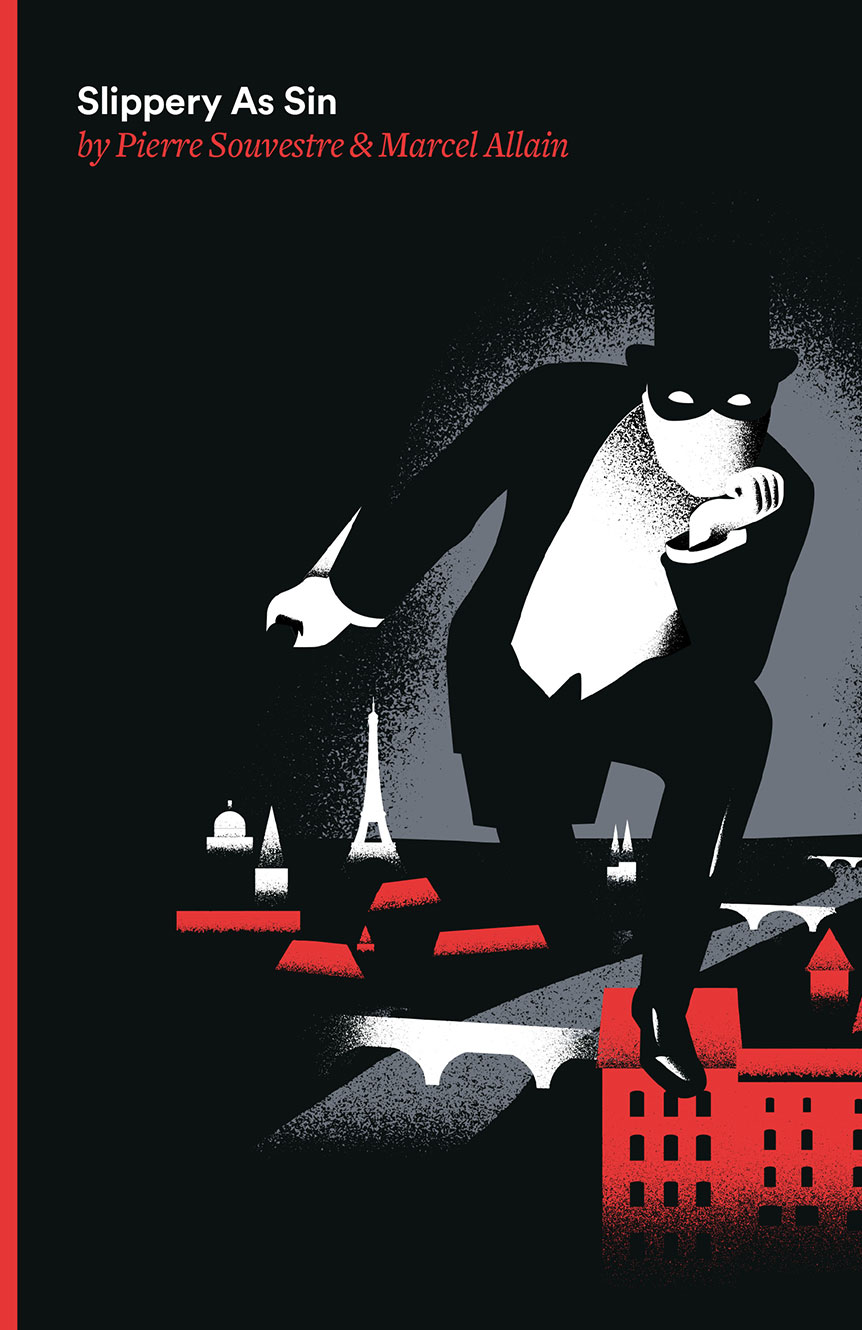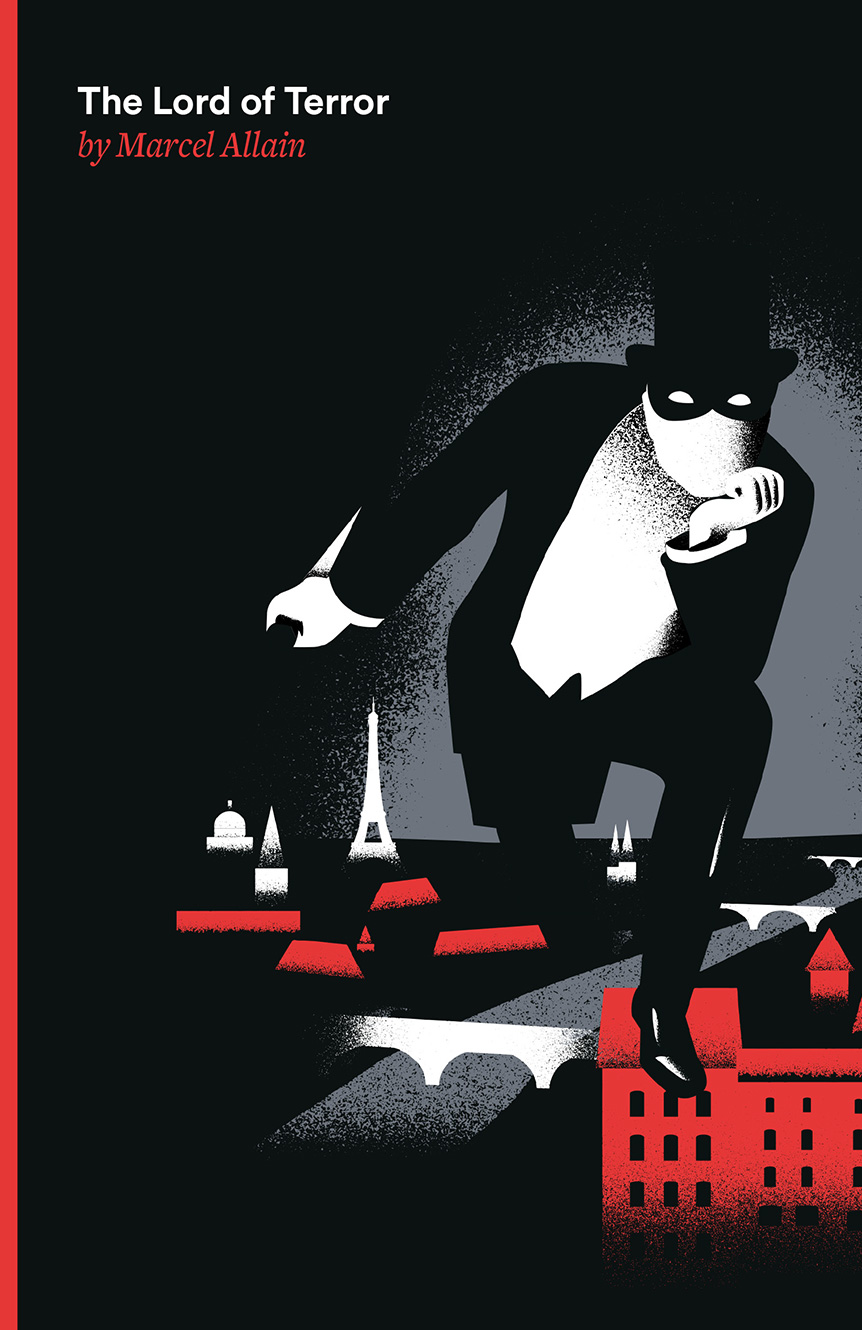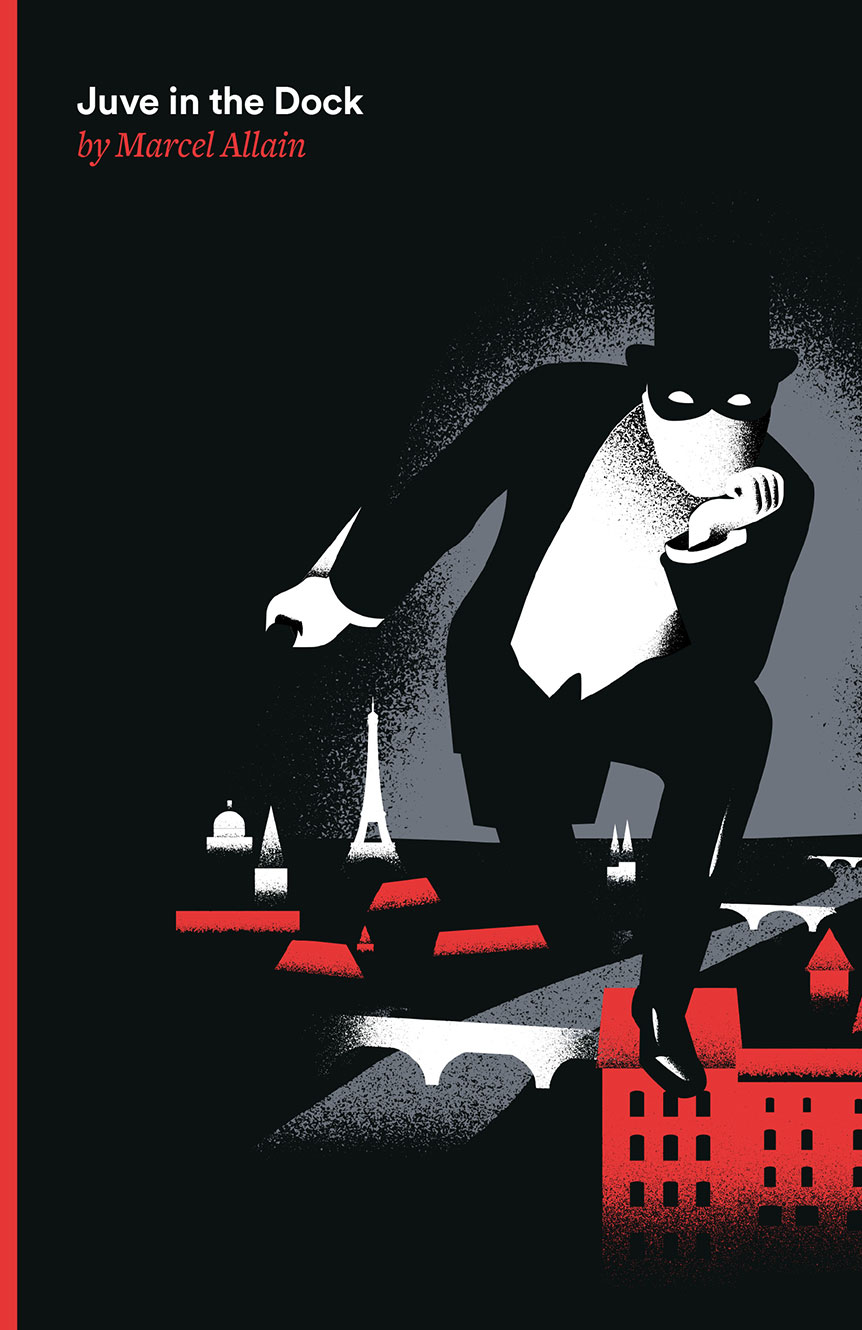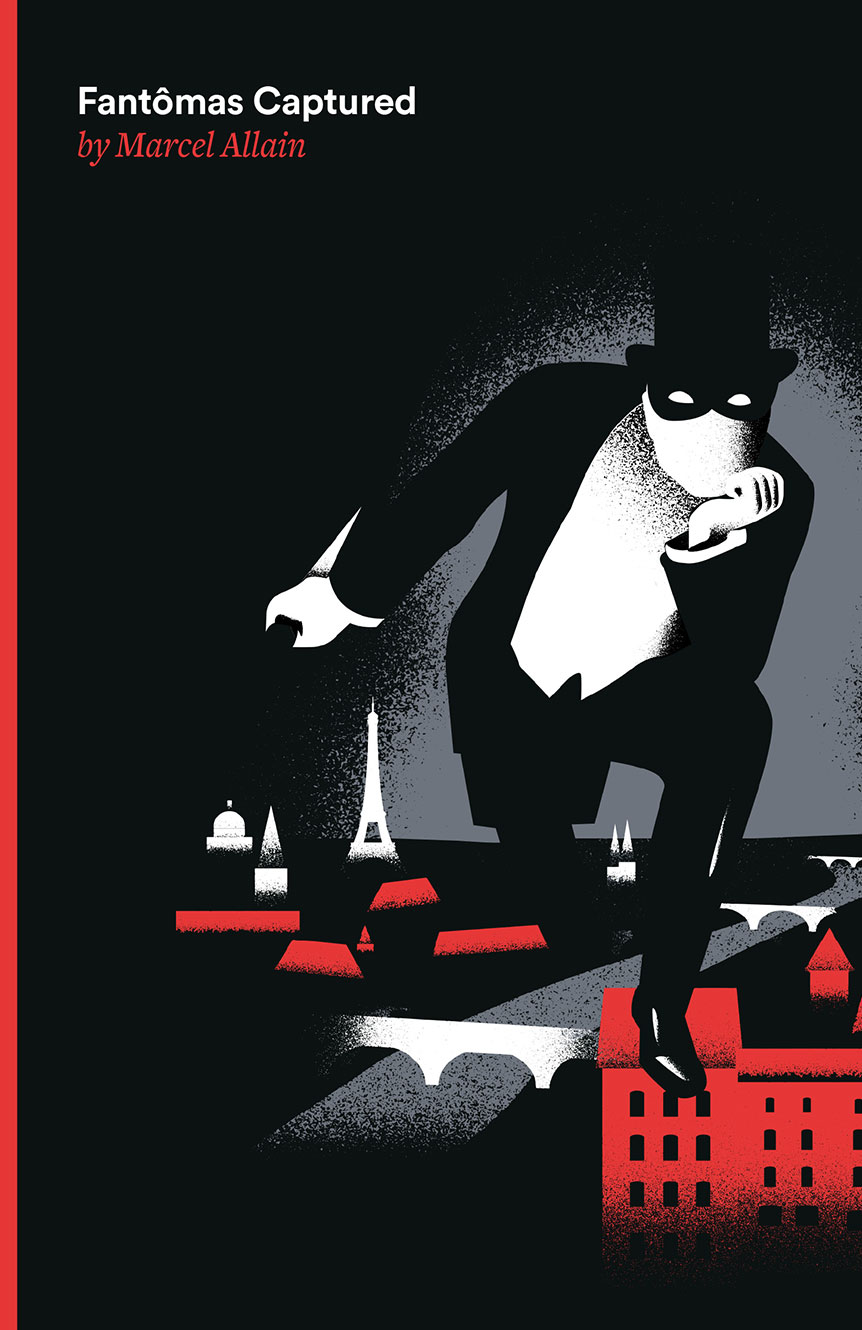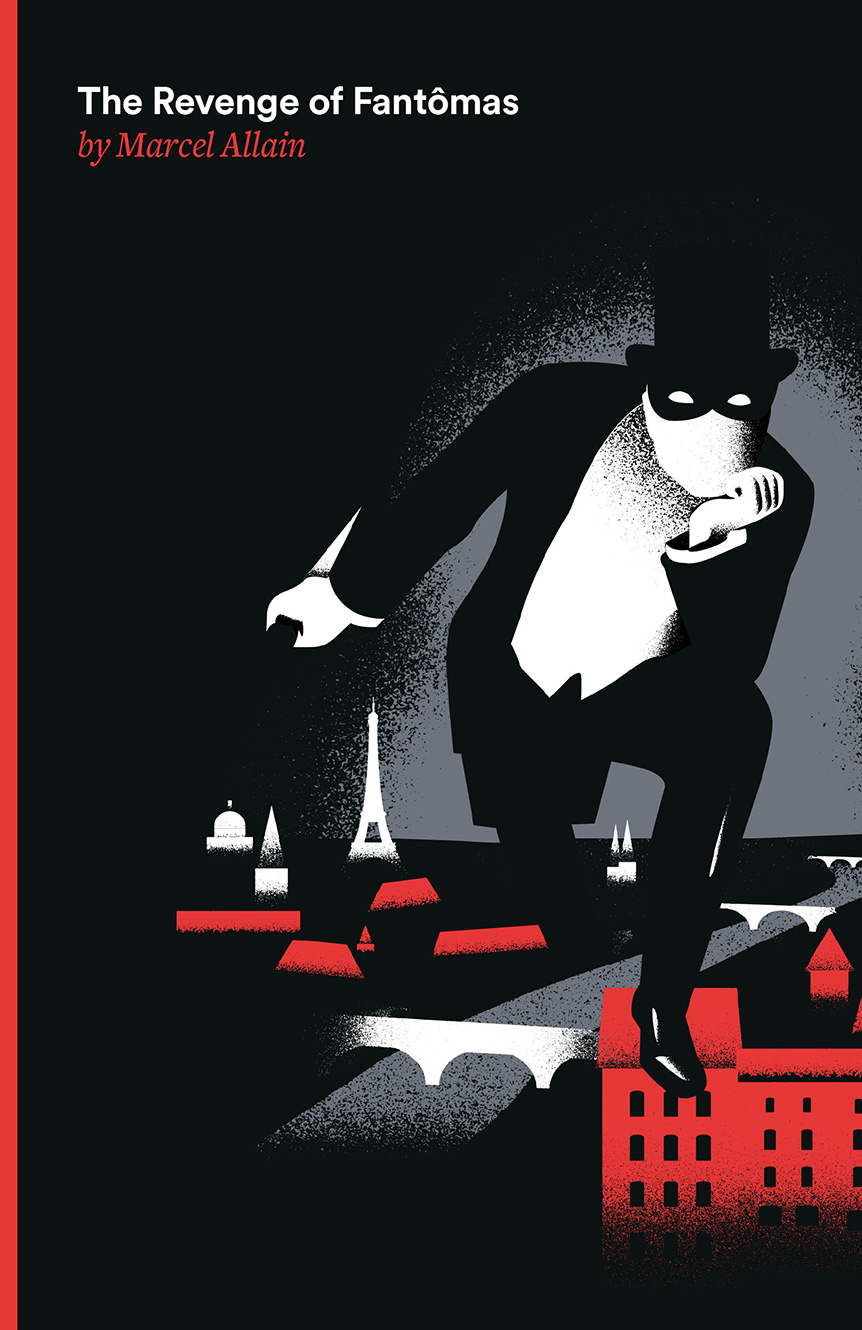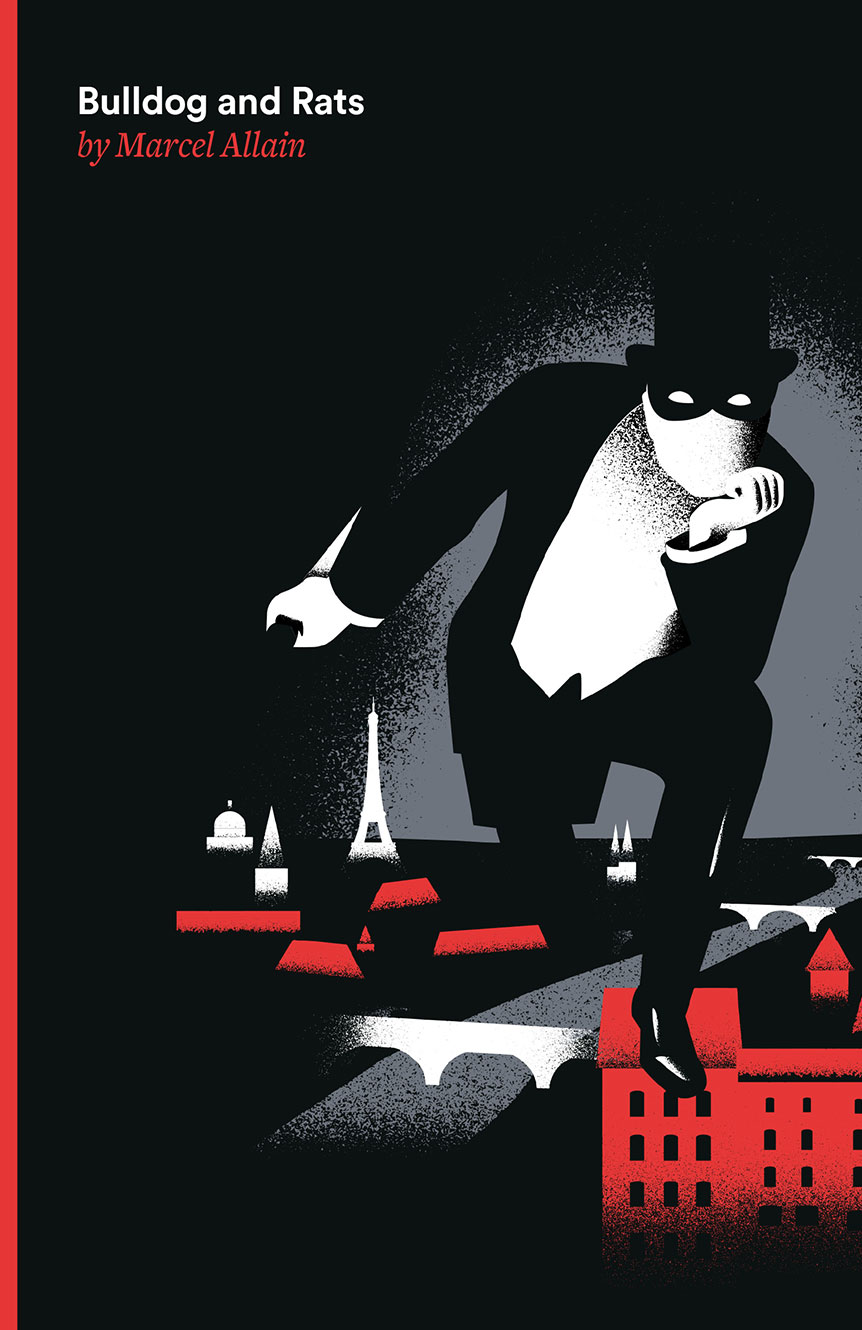The Exploits of Juve
Being the Second of the Series of the Fantômas Detective Tales
When the home of Dr. Chaleck is robbed and the corpse of a woman found crushed to death, Inspector Juve pursues the gang leader Loupart in connection with the gruesome crime. He and the journalist Jerome Fandor relentlessly pursue suspects, narrow escaping high-speed train wrecks, blazing infernos, and the diabolical snares of the Genius of Crime, Fantômas.
“From the imaginative standpoint Fantômas is one of the richest works that exist.”
—Guillaume Apollinaire
“Absurd and magnificent lyricism.”
—Jean Cocteau
- The Comrades’ Tryst
- On the Track
- Behind the Curtain
- A Woman’s Corpse
- Loupart’s Anger
- The Lâriboisère Hospital
- A Revolver Shot
- The Search for the Criminal
- In the Refrigeratory
- The Bloody Signature
- The Shower of Sand
- Following Josephine
- Robbery, American Fashion
- Flight Through the Night
- The Simplon Express Disaster
- A Drama at the Bercy Warehouse
- On the Slabs of the Morgue
- Fantômas’ Victim
- The Englishwoman of Boulevard Inkermann
- The Arrest of Josephine
- At the Monmartre Fête
- The Pugilist’s Whim
- “State’s Evidence”
- A Mysterious Clasp
- The Trap
- At the House of Bonardin, The Actor
- The Mother Superior
- An Old Paralytic
- Through the Window
- Uncle and Nephew
- Lovers and Accomplices
- The Silent Executioner
- A Scandal in the Cloister
- Fantômas’ Revenge
1. The Comrades’ Tryst
“A bowl of claret, Father Korn.”
The raucous voice of big Ernestine rose above the hubbub in the smoke-begrimed tavern.
“Some claret, and let it be good,” repeated the drab, a big, fair damsel with puckered eyes and features worn by dissipation.
Father Korn had heard the first time, but he was in no hurry to comply with the order.
He was a bald, whiskered giant, and at the moment was busily engaged in swilling dirty glasses in a sink filled with tepid water.
This tavern, “The Comrades’ Tryst,” had two rooms, each with its separate exit. Mme. Korn presided over the first in which food and drink were served. By passing through the door at the far end, and crossing the inner courtyard of the large seven-story building, the second “den” was reached—a low and ill-lit room facing the Rue de la Charbonnière, a street famed in the district for its bad reputation.
At a third summons, Father Korn, who had sized up the girl and the crowd she was with, growled:
“It’ll be two moons; hand over the stuff first.”
Big Ernestine rose, and pushing her way to him, began a long argument. When she stopped to draw a breath, Korn interposed:
“It’s no use trying that game. I said two francs and two francs it is.”
“All right, I won’t argue with a brute like you,” replied the girl. “Everyone knows that you and Mother Korn are Germans, dirty Prussians.”
The innkeeper smiled quietly and went on washing his glasses.
Big Ernestine glanced around the room. She knew the crowd and quickly decided that the cash would not be forthcoming.
For a moment she thought of tackling old Mother Toulouche, ensconced in the doorway with her display of portugals and snails, but dame Toulouche, snuggled in her old shawl, was fast asleep.
Suddenly from a corner of the tavern, a weary voice cried with authority:
“Go ahead, Korn, I’ll stand treat.”
It was the Sapper who had spoken.
A man of fifty who owed his nickname to the current report that he had spent twenty years in Africa, both as a soldier and a convict.
While Ernestine and her friends hastened to his table, the Sapper’s companion, a heavily built man, rose carelessly and slouched off to join another group, muttering:
“I’m too near the window here.”
“It’s Nonet,” explained the Sapper to Ernestine. “He’s home from New Caledonia, and he doesn’t care to show himself much just now.”
The girl nodded, and pointing to one of her companions, became confidential. “Look at poor Mimile, here. He’s just out of quod and has to start right off to do his service. Pretty tough.”
The Sapper became very interested in the conversation. Meanwhile Nonet, as he crossed the taproom, had stopped a few moments before a pretty girl who was evidently expecting someone.
“Waiting again for the Square, eh, Josephine?” Nonet inquired.
The girl, whose big blue eyes contrasted strikingly with her jet black hair, replied:
“Why not? Loupart doesn’t think of quitting me that I know of.”
“Well, when he does let me know,” Nonet suggested smilingly.
Josephine shrugged her shoulders contemptuously, and, glancing at the clock above the bar, rose suddenly and left the taproom.
She went rapidly down the Rue Charbonnière and along the boulevard, in the direction of the Barbès Metropolitan Station. On reaching the level of the Boulevard Magenta, she slackened and walked along the right-hand pavement toward the center of Paris.
“My little Jojo!”
The girl who, after leaving the tavern, had assumed a quiet and modest air, now came face to face with a stout gentleman with a jovial face and one gleaming eye, the other eye being permanently closed. He wore a beard turning gray and his derby hat and light cane placed him as belonging to the middle class.
“How late you are, my adored Jojo,” he murmured tenderly. “That accursed workshop been keeping you again after hours?”
The mistress of Loupart checked a smile.
“That’s it!” she replied, “the workshop, M. Martialle.”
The man addressed made a warning gesture.
“Don’t mention my name here; I’m almost home.” He pulled out his watch. “Too bad; I’ll have to go in or my wife will kick up a row. Let’s see, this is Tuesday; well, Saturday I’m off to Burgundy on my usual half-monthly trip. Meet me at the Lyons station, platform No. 2, Marseilles express. We won’t be back till Monday. A delightful weekend of lovemaking with my darling who at last consents.... What’s that!”
The stout man broke off his impassioned harangue. A beggar, emerging from the darkness, importuned him:
“Have pity on me, kind sir.”
“Give him something,” urged Josephine.
The middle-aged lover complied and tenderly drew away the pretty girl, repeating carefully the details of the assignation:
“Lyons Station; a quarter past eight. The train leaves at twenty to nine.”
Then suddenly dropping Josephine’s arm:
“Now, sweetheart, you’d better hurry home to your good mother, and remember Saturday.”
The outline of the portly personage faded into the night. Loupart’s mistress shrugged her shoulders, turned, and made her way back to the “Tryst,” where her place had been kept for her.
At the back of the tavern, the group which Nonet had joined were discussing strange doings. “The Bear,” head of the band of the Ciphers, had just returned from the courthouse. He brought the latest news. Riboneau had been given ten years, but was going to try for a reduced sentence.
The talk suddenly dropped. A hubbub arose outside, a dull roar which waxed louder and louder. The sound of hurrying footsteps mingled with shrill cries and oaths. Doors in the street slammed. A few shots were fired, followed by a pause, and then the stampede began again.
Father Korn, deserting his bar, warily planted himself at the entry to his establishment, his hand on the latch of the door. He stood ready to bar entrance to any who might try to press in.
“The raid,” he warned in a low tone.
His customers, glad to feel themselves in safety, followed the vicissitudes of what to them was almost a daily occurrence.
First came the frenzied rush of the “street walkers,” deserted by their sinister protectors and fleeing madly in search of shelter in terror of the lockup. Behind the shrieking herd the constables, in close ranks, swept and cleared the street, leaving no corner, no court, no door that remained ajar unsearched. Then the whirl swept away, the noise died down, and the street resumed its normal aspect: drab, weird and alarming.
Father Korn laughed. “All they’ve bagged is Bonzville!” he cried, and the customers responded to his merriment. The police had been fooled again. Bonzville was a harmless old tramp, who got himself “jugged” every winter on purpose to lay up for repairs.
The passage of the “driver” had caused enough stir in the taproom to distract attention from the entry at the back of a stoutly built man with a bestial face, known by the title of “The Cooper.”
Swiftly he passed to the Beard’s table, and, taking the latter aside, began:
“The big job is fixed for the end of the week. On my way back from the station I saw Josephine palavering with the swell customer....”
Suddenly the Beard stopped him short.
The general attention had become fixed on the street entrance to the taproom. The door had opened with a bang and Loupart, alias “The Square,” the popular lover of the pretty Josephine, came on the scene, his eyes gleaming, his lips smiling under his upturned mustache.
Then there broke out cries of stupefaction. Loupart was between two policemen, who had stopped short in the doorway.
The Square turned to them: “Thank you, gentlemen,” he said in his most urbane tone. “I am very grateful to you for having seen me this far. I am quite safe now. Let me offer you a drink to the health of authority!”
However, the two policemen did not dare to enter the tavern, so they briefly declined and made off. Josephine had risen, and Loupart, after pressing a tender kiss upon her lips, turned to the company.
“That feazes you, eh! I was just heading this way when I ran into the drive. As I’m a peaceful citizen, I got hold of two cops and begged them to see me safely home. They thought I was really scared.”
There was a burst of general laughter. No one could bluff the police like the Square.
Loupart turned to Josephine: “How are things going, ducky?”
The girl repeated in a low tone to her lover her recent talk with M. Martialle.
Loupart nodded approvingly, but grumbled when he found the meeting was fixed for Saturday.
“Hang the fellow! Must hustle with all the jobs on hand this week. Anyway, we won’t let this one slip by. Plenty of shiners, eh, Josephine?”
“You bet. He carries the stuff to his partners every fortnight.”
“That’s first rate, but in the meantime there’s something doing tonight. Here, kiddy, take a pen and scratch off a letter for me.”
The Square dictated in a low voice:
“Sir, I am only a poor girl, but I’ve some feeling and honesty and I hate to see wrong done around me. Believe me, you’d better keep an eye open on someone pretty close to me. Maybe the police have already told you I am the mistress of Loupart, alias the Square. I’m not denying it; in fact, I’m proud of it. Well, I swear to you that this Loupart is going to try a dirty game.”
Josephine stopped writing.
“Look here, what are you at?”
“Scribble, and don’t bother yourself. This doesn’t concern you,” replied Loupart drily.
Josephine waited, docile and ready, but the Square’s attention was now focussed upon Ernestine, her young man and the generous Sapper.
“Yes,” Ernestine was explaining to Mimile while the Sapper nodded approvingly, “the Beard is, as you might say, the head of the band of Ciphers, next to Loupart, of course. To belong to the Beard’s gang you’ve got to have done up at least one guy. Then you get your Number 1. Your figure increases according to the number of deaders you have to your credit.”
“So then,” inquired Mimile, with eager curiosity, “Riboneau, who has just been sentenced, is called number ‘seven’ because ...”
“Because,” added the Sapper in his serious voice, “because he has killed off seven.”
In a few curt questions the Square posted himself as to young Mimile, who had impressed him favorably.
Josephine turned to Loupart: “What else am I to put in the letter? Why are you stopping?”
For answer, the Square suddenly sprang to his feet, seized a half-empty bottle and flung it on the floor, where it broke. This act of violence sent the company scattering, and Loupart roared out:
“It’s on account of spies that I’m stopping! By God! When are we going to see their finish? And besides,” he added, staring hard at Ernestine, “I’ve had enough of all this nonsense; better clear out of here or there’ll be trouble.”
Cunningly, with bloodshot eyes, her fists clenched in fury, but humbly submissive, the girl made ready to comply. She knew the Square was master, and there was no use standing out against his will.
The Sapper himself, growling, picked up his change, little disposed to have a row, and beckoning to his comrade, Nonet, effected a humble exit under cover of the girl Ernestine.
Loupart’s arm fell upon the shoulder of Mimile, who alone seemed to defy Josephine’s formidable lover.
“Hold on, young ‘un,” ordered Loupart. “You seem to have some nerve; better join us.”
Mimile’s eyes lit up with joy.
“Oh!” he stammered, “Loupart, you’ll take me in the Cipher gang?”
“Maybe,” was the enigmatic reply. Then with a shove he sent the young man to the back of the den. “Must go and talk it over with the Beard.” Without paying heed to the thanks of his new recruit, Loupart continued his dictation to Josephine.
As the Sapper and Nonet went quickly down the Rue Charbonnière, Nonet inquired:
“Well, chief, what do you think of our evening?”
The individual that the hooligans of La Chapelle knew by the nickname of the Sapper, and who was no other than Inspector Michel, slowly stroked his long beard:
“Not much,” he declared, “except that we’ve been bluffed by the Square.”
“Why not round up the bunch?” suggested Nonet, who was known as Inspector Léon.
“It’s easy enough to talk, but what can two do against twenty? Who wants to take such risks for sixty dollars a month?”
In the meantime Josephine was writing at the Square’s dictation:
“I know, sir, that tomorrow Loupart will be at Garnet’s wineshop at seven o’clock, which you know is to the right as you go up the Faubourg Montmartre, before you reach the Rue Lamartine. From there he will go to Doctor Chaleck’s to tackle the safe, which is placed, as I told you, at the far side of the study, facing the window, with its balcony overlooking the garden. I wouldn’t have meddled in the matter except that there’ll be something worse regarding a woman. I can’t tell you any more, for this is all I know. Make the best of it, and for God’s sake never let Loupart know the letter was sent to you by the undersigned.
“Very respectfully,”
About to sign her name, Josephine looked up, trembling and anxious.
“What does it mean, Loupart? You’ve been drinking, I’m sure you have!”
“Sign, I tell you,” calmly replied the Square, and the girl, hypnotized, proceeded to trace in her large clumsy hand, her name, “Josephine Ramot.”
“Now put it in an envelope.”
From the end of the saloon the Beard was signaling Loupart.
“What is it?” the latter cried, annoyed at the interruption.
The Beard came near and whispered:
“Important business. The dock man’s scheme is going well—it’ll be for the end of the week, Saturday at latest.”
“In four days, then?”
“In four days.”
“All right,” declared Josephine’s lover, “we’ll be on hand. It’ll be a big haul, I hear.”
“Fifty thousand at least, the Cooper told me.”
Loupart nodded, waved the Beard aside and resumed:
“Address it to: Monsieur Juve, Commissioner of Safety, at the Prefecture, Paris.”
(End of Chapter 1 of The Exploits of Juve)
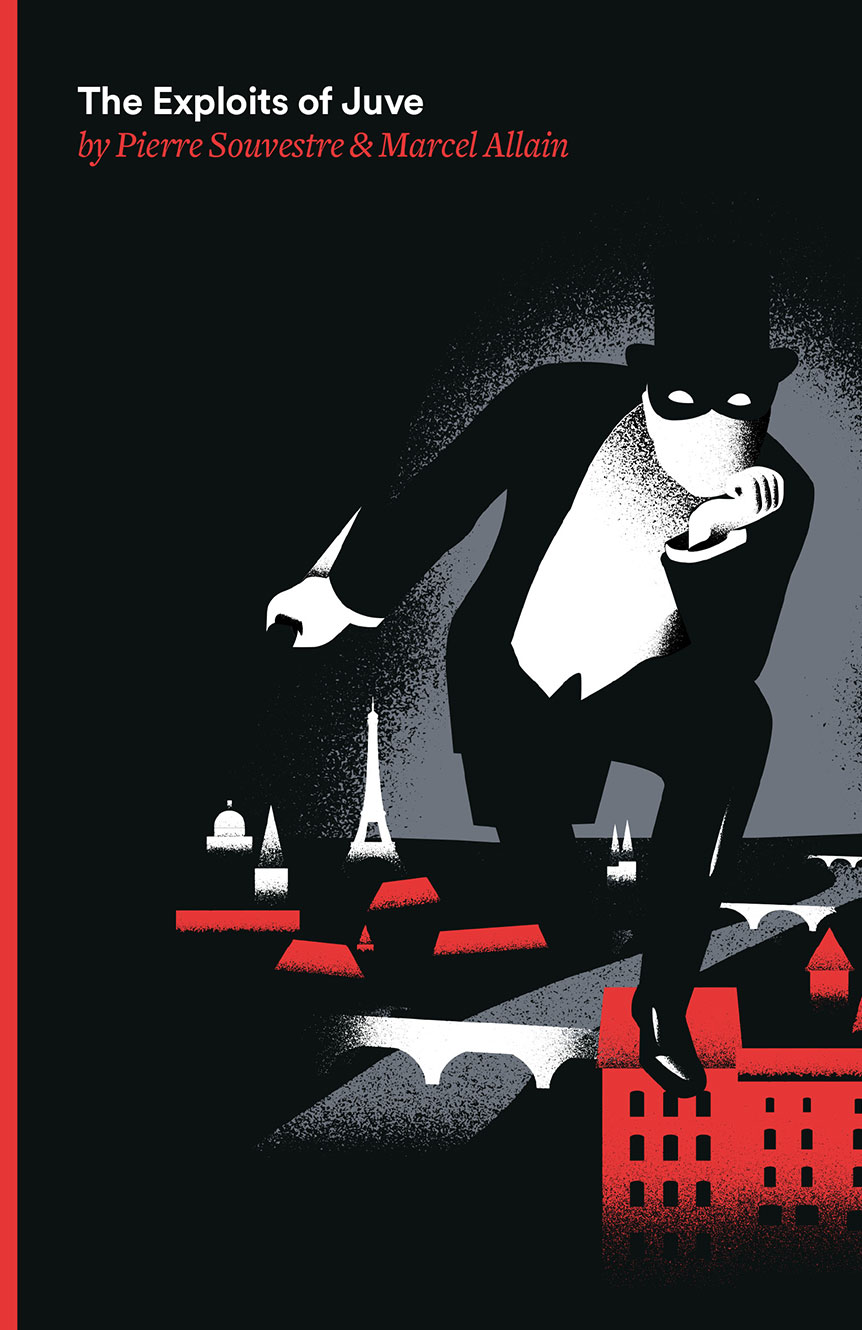
This Antipodes edition, first published in 2014, is a republication of the work first published by Brentano’s Publishers Inc., New York, in 1917. The translation has been slightly altered to reflect modern spelling and usage. Originally published in French as Juve contre Fantômas in 1911.
ISBN: 978-0-9882026-2-7
198 pages
Antipodes books are distributed worldwide by Ingram Content Group
